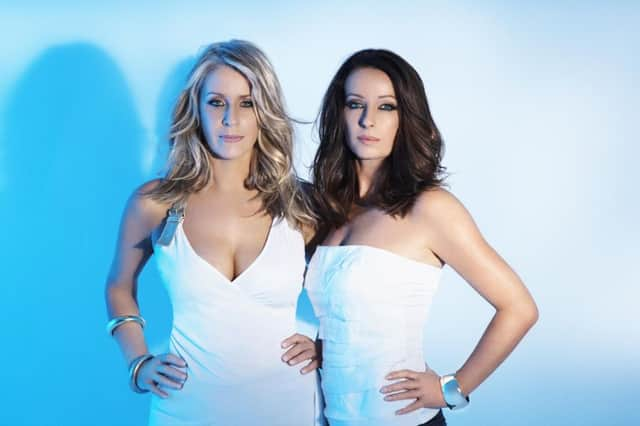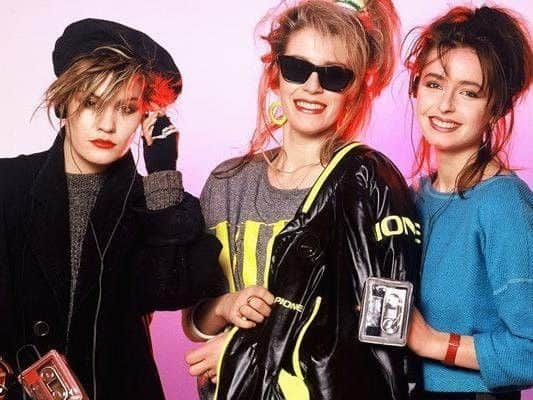'˜There's still the shared love of what we do and it is an excuse to just have a laugh' says Keren Woodward on the Bananarama reunion


Perhaps it’s a sign of nostalgia for more innocent times but few reunions of 80s pop groups have been greeted with quite the same excitement as the announcement that Siobhan Fahey is rejoining her old bandmates Keren Woodward and Sara Dallin in Bananarama. The trio are due to embark on a sold-out UK tour this autumn but in the meantime Woodward and Dallin are playing a smattering of summer shows as a duo – as they’ve done for the past two decades. Among them is the finale of Grassington Festival.
“When we were asked to do it I looked it up and it looked like such a lovely little festival,” says 56-year-old Woodward. “I’ve been walking a few times up in the Yorkshire Dales. I used to have a friend who lived up there, and it’s just so beautiful, so I’m really looking forward to that one.”
Advertisement
Hide AdAdvertisement
Hide AdBananarama’s roots actually go back to the post-punk era. For a time they lived above a rehearsal room owned by the Sex Pistols’ drummer Paul Cook and Malcolm McLaren is said to have once offered his services as manager (they turned him down).


“Sara and I moved to London [from Bristol where they’d been friends since the age of four] and moved in the YWCA,” says Woodward. “We were asked to leave, I think we were constantly ringing the bell because they closed the doors at 10pm which didn’t suit us as teenagers in London.
“We’d met Paul Cook on numerous occasions and become very friendly with him. He said, ‘You could move in here temporarily’ and Sara and I spent about a year and a half living in kind of a hovel, really. We loved it but I wouldn’t live there now – there was no hot water and leaks in the roof, but it was all very exciting because it was in the West End.
“When we were first recording we had our little cassette with one or two songs on it and we did a few shows, one as one of the support acts for the Jam. Paul [Weller] was trying to do something different and he had lots of types of acts on before The Jam, none of which Jam fans wanted to see at all. They weren’t really interested in watching three girls jumping up and down singing pop songs and it didn’t go down overly well, but it was good experience.
Advertisement
Hide AdAdvertisement
Hide AdSome of the spirit of the times definitely rubbed off on the fledgling girl group. “It was just an attitude,” Woodward says. “I come from a very conventional family but as a girl I was brought up to achieve at whatever I turned my mind to. But I think the post-punk thing in London was so exciting because the people who’d grown up with that had it in their heads that if you wanted to do something just give it a go and I think that influenced us hugely.


“I think the fact that as group we did it ourselves and we wore home made clothes, we weren’t styled, but everyone was like that.
“I think the reason the 80s has endured as a decade was because everyone did their own thing; it wasn’t as corporate as it is now. Maybe it has to be corporate now because record sales are so poor because of streaming and the way things have gone, the record companies don’t have the money to put into developing acts or to throw at acts like us and let us get on with it, which is essentially what happened. I don’t think they really understood why it worked but it worked so they let us get on with it.”
Bananarama’s first top 10 hits, T’ain’t What You Do and Really Saying Something, were collaborations with the Fun Boy Three. Woodward explains they came about after singer Terry Hall heard a demo of theirs on the John Peel show on BBC Radio 1 and saw a picture of them in style magazine The Face. “From very small beginnings he was doing his new venture with Neville Staples and Lynval Golding from The Specials and it was again a very similar attitude. We played on all those tracks as well, we played a drum each, I sat with Terry and played piano on Really Saying Something and T’ain’t What You Do. It was a great introduction for us. We were very nervous because we’d only performed in the odd nightclub and doing backing vocals for people. We were very concerned that eh thought we were some kind of professional act, which wasn’t the case especially at that stage.”
Advertisement
Hide AdAdvertisement
Hide AdBy the time of their first album, Deep Sea Skiving, Bananarama had become regular fixtures in the UK charts. For its follow-up, however, they chose to address more serious topics in songs such as Rough Justice, Cruel Summer and Robert De Niro’s Waiting...
“It was how we felt and our concerns at the time,” says Woodward. “I think with some people it just went unnoticed because essentially they were pop songs but none of us were stupid and we were all very socially aware. We lived the life that we were talking about so we wrote songs about stuff that was going on around us.
“I think as you grow up it’s not that you become less socially aware but you end up writing about things that happen. At the time maybe we were a little more emotionally inhibited than you are as you get older writing about love. I remember people using terms of love when we were writing songs in the studio and saying ‘Oh no, I couldn’t write that in a song, it’s embarrassing’, so that’s why were writing about stuff that was happening at the time. But as you mature you write about different things that are going on in your life, maybe things that are important to you at that time.”
In 1986 Bananarama approached the production team Stock Aitken Waterman to work on their next record. Woodward explains: “We went to them because we’d heard the Dead Or Alive single [You Spin Me Round] and loved that sound, that Hi-NRG, it was very new at the time and it was exciting to us.”
Advertisement
Hide AdAdvertisement
Hide AdThe collaboration yielded a US Number One, Venus, followed by the dance-orientated album Wow!, which was another huge success but led to fractures within the group.
“I’d personally found exactly what I wanted to do because it was just so much fun,” says Woodward. “Siobhan was very proud of that album but was less comfortable with that pure, quite camp pop, but for me I was absolutely in my element.
“It did sour a little in that we were the only the act they worked with that on a writing level. They became this sort of ‘Hit Factory’, and they just wanted to write and record with other people. I think after sticking our oar in and wanting something more personal and wanting to be involved maybe it was a bit more difficult for them.”
Fahey’s decision to quit the group in 1988 and form Shakespears Sister didn’t come as a shock to Woodward. “We’d been in each other’s pockets for years and years, 24 hours a day, even living in houses next door to each other. Even when we moved we were still close to each other. Siobhan had met Dave [Stewart of Eurythmics] and was spending a lot of time out of the country living in LA. I can’t pretend that there wasn’t any bad feeling at all. I think she’d felt left out and we felt that she’d gone off and left us but it was just a natural parting of the ways and I think when it happened it was almost a relief for all of us.”
Advertisement
Hide AdAdvertisement
Hide AdAfter Fahey left, Bananarama went on their first tour with her replacement, Jacquie O’Sullivan, but her stay was short-lived. For the last 25 years Woodward and Dallin have recorded and toured as a duo. The reunion with Fahey was the culmination of a gradual process, says Woodward.
“We’d seen Siobhan a few times then a few years back Sara and I went on a bit of a road trip round the States with our grown-up kids and spent some time with Siobhan in LA. All our kids got together for the first time which was great and we had a few evenings out then we kept that going because she’s over here three or four times a year.
“There was a point either last summer or the summer before where we were having a dance round Siobhan’s kitchen and a singsong and we all had our arms around each other and there was so much feeling there and so much love. It was almost as though things hadn’t changed. We’d just done some really big shows in the summer, some festivals and I did say to Siobhan: ‘You’ve no idea how it feels to be with us on stage and have 10,000 people sing your songs back at you, it makes you realise the body of work you’ve done and it’s such a celebration’. We just started talking about maybe we should do a show together and then, as much as it would be easy for Sara and I because we’ve been doing it for so long, for Siobhan to almost re-learn everything to do a show seemed a bit ridiculous.
“There was a point where I was talking to Sara and a friend just before Christmas and I said: ‘I think we should do this’ because it seemed like one of those now or never moments. So I called Siobhan out of the blue and she was very shell-shocked to the point where she could barely speak. I just left it with her and said: ‘Call me in a few days, tell me what you think about the idea’.
Advertisement
Hide AdAdvertisement
Hide Ad“Until she came over we weren’t really sure if we’d have the same ideas and then we sat down together and laughed and talked and all got very excited and decided to do it – and I couldn’t be more thrilled.”
It’s that sense of camaraderie that seems to have endeared the group to the British public. “We’ve remained best friends and it’s endured more than most of my friends’ marriages,” Woodward reflects. “I live in Cornwall now, Sara lives in London, Siobhan mostly lives in LA but there’s still the shared love of what we do and it is an excuse to just have a laugh.
“Sara and I didn’t stop working but we certainly slowed down for a period in the 90s which was great because you rejuvenate yourself then it all gets too much and you really miss it and you get back to doing it. I’ve never really tired of doing the shows, to be honest.”
Bananarama play at Grassington Festival on July 1 (grassington-festival.org.uk/) and as a trio at York Barbican on November 16 and Sheffield City Hall on December 5 (bananarama.co.uk).